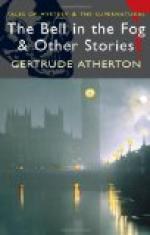In some of the superb traps were decrepit old dowagers wagging their feeble heads, wondering, perhaps, how much longer their millions would keep them alive. Sometimes their young heirs were with them, patient and placid. Others were pitifully alone. Several men were on horseback, riding in the agonized fashion of the day. There were carriages full of girls with complexions of ivory and claret, air of ineffable daintiness. Now and then a victoria would roll by in which women lolled, heavily veiled with crape. Webb wondered if they really could sorrow like common folks. Mingling with the superb turnouts were barouches unmistakably hired, occupied by people dressed with a certain cheap smartness. Here and there a girl, probably of the people, cantered half defiantly down the line, a sailor-hat on her head, her jacket open over a shirt and “four-in-hand.” Once a yoke of oxen, driven by a bareheaded maid, straggled into the throng.
The avenue before the hotel became deserted once more. The upper end was blocked with carriages, all apparently bent in the same direction. Andrew ran down the steps, half inclined to follow, half fearing they would never return. A number of open hacks stood before the hotel. A driver immediately approached Andrew.
“Like a drive, sir?”
“Yes,” said Webb. “Go where the others are going.”
“Certainly, sir. And, if you be a stranger, I can tell you most of the names.”
Andrew could have tipped him on the spot. He should be able to identify those people at last! He felt that he had advanced another step!
“We’ll drive slow and meet them on their return,” said the driver. He indicated with a gesture of contempt a passing carriage.
“You see them, sir? They be people that comes to the hotels and goes away and talks about spending the summer in Newport. But any one could tell that they’re just hotel people, and that the hack is hired. They don’t deceive nobody here.”
The words gave Andrew a hint for which he was thankful. He understood that he must not stay at the hotel. Where should he go, however? He must take a “cottage,” he supposed.
They rolled down a thick-leaved avenue and out over the stubby sand-hills by the sea. Here and there a large mansion crowned the heights, and Andrew was glad to see the traditional cottage in full relief. He paid it scant attention, however. The procession of carriages had already turned, and his faithful guide uttered many a name which sounded like old sweet music in his ears. Some of the younger faces were unfamiliar; but they, too, bore names that the newspapers had made famous.
“Now look with all your eyes,” cried the driver, suddenly. “Here’s Mrs. Johnny Belhaven. She’s worth more millions than all the rest put together, and is an A1 whip.”
A plump but distinguished-looking woman bore down on them in what appeared to be a chariot. Andrew had never seen anything so high on wheels before. Mrs. Belhaven looked down upon her “Order” as from a throne, and wore a slightly supercilious expression.




